Kirby & West: Analyzing International Business Expansion in China
VerifiedAdded on 2023/04/22
|16
|5252
|491
Report
AI Summary
This report provides an executive summary of Kirby & West's potential expansion into the Chinese dairy market. It analyzes the drivers favoring expansion, such as China's large population, stable political environment, economic growth, and technological advancements. The report identifies trade barriers like import tariffs, documentation requirements, labeling regulations, and trade restrictions from the US. It also discusses uncertainties stemming from the China-US trade war, government focus on domestic production, and VAT irregularities. The report highlights opportunities created by Chinese government policies, including infrastructure investment, lowered tax barriers, and FDI promotion. Ethical and social issues, along with cultural preferences, are also considered. The report recommends a joint venture strategy for market entry, offering a detailed analysis of the market and a strategic roadmap for success.
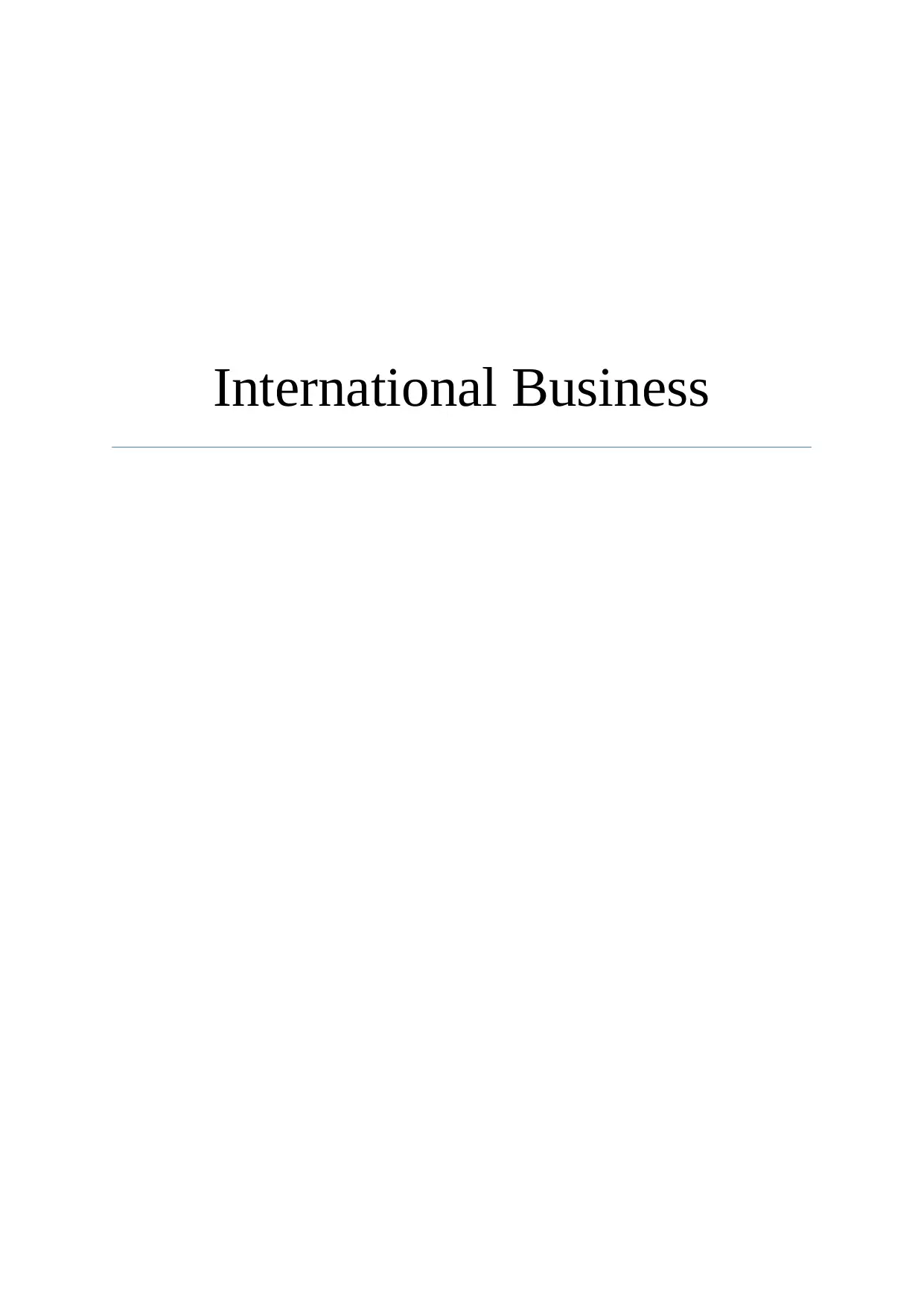
International Business
Paraphrase This Document
Need a fresh take? Get an instant paraphrase of this document with our AI Paraphraser
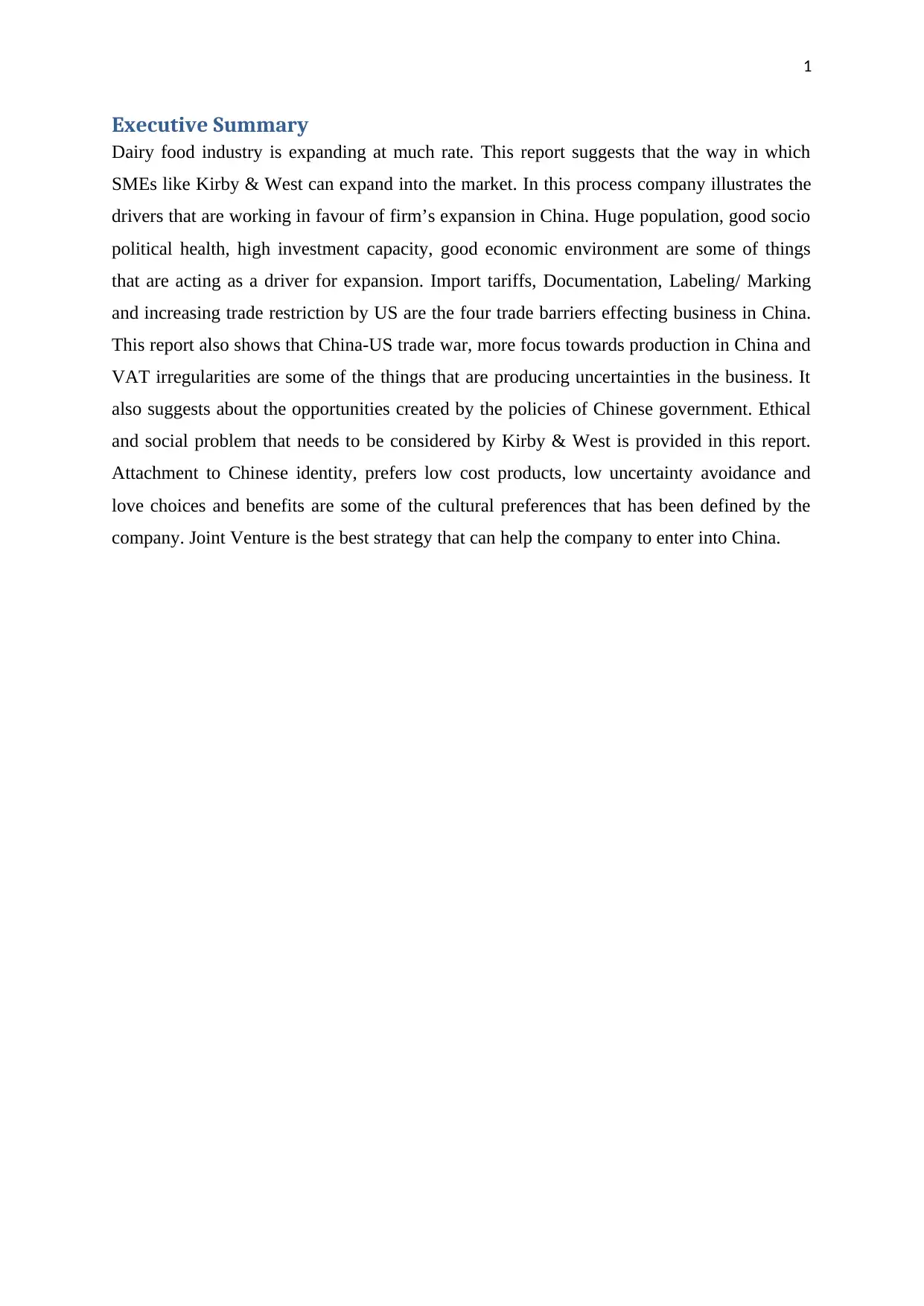
1
Executive Summary
Dairy food industry is expanding at much rate. This report suggests that the way in which
SMEs like Kirby & West can expand into the market. In this process company illustrates the
drivers that are working in favour of firm’s expansion in China. Huge population, good socio
political health, high investment capacity, good economic environment are some of things
that are acting as a driver for expansion. Import tariffs, Documentation, Labeling/ Marking
and increasing trade restriction by US are the four trade barriers effecting business in China.
This report also shows that China-US trade war, more focus towards production in China and
VAT irregularities are some of the things that are producing uncertainties in the business. It
also suggests about the opportunities created by the policies of Chinese government. Ethical
and social problem that needs to be considered by Kirby & West is provided in this report.
Attachment to Chinese identity, prefers low cost products, low uncertainty avoidance and
love choices and benefits are some of the cultural preferences that has been defined by the
company. Joint Venture is the best strategy that can help the company to enter into China.
Executive Summary
Dairy food industry is expanding at much rate. This report suggests that the way in which
SMEs like Kirby & West can expand into the market. In this process company illustrates the
drivers that are working in favour of firm’s expansion in China. Huge population, good socio
political health, high investment capacity, good economic environment are some of things
that are acting as a driver for expansion. Import tariffs, Documentation, Labeling/ Marking
and increasing trade restriction by US are the four trade barriers effecting business in China.
This report also shows that China-US trade war, more focus towards production in China and
VAT irregularities are some of the things that are producing uncertainties in the business. It
also suggests about the opportunities created by the policies of Chinese government. Ethical
and social problem that needs to be considered by Kirby & West is provided in this report.
Attachment to Chinese identity, prefers low cost products, low uncertainty avoidance and
love choices and benefits are some of the cultural preferences that has been defined by the
company. Joint Venture is the best strategy that can help the company to enter into China.
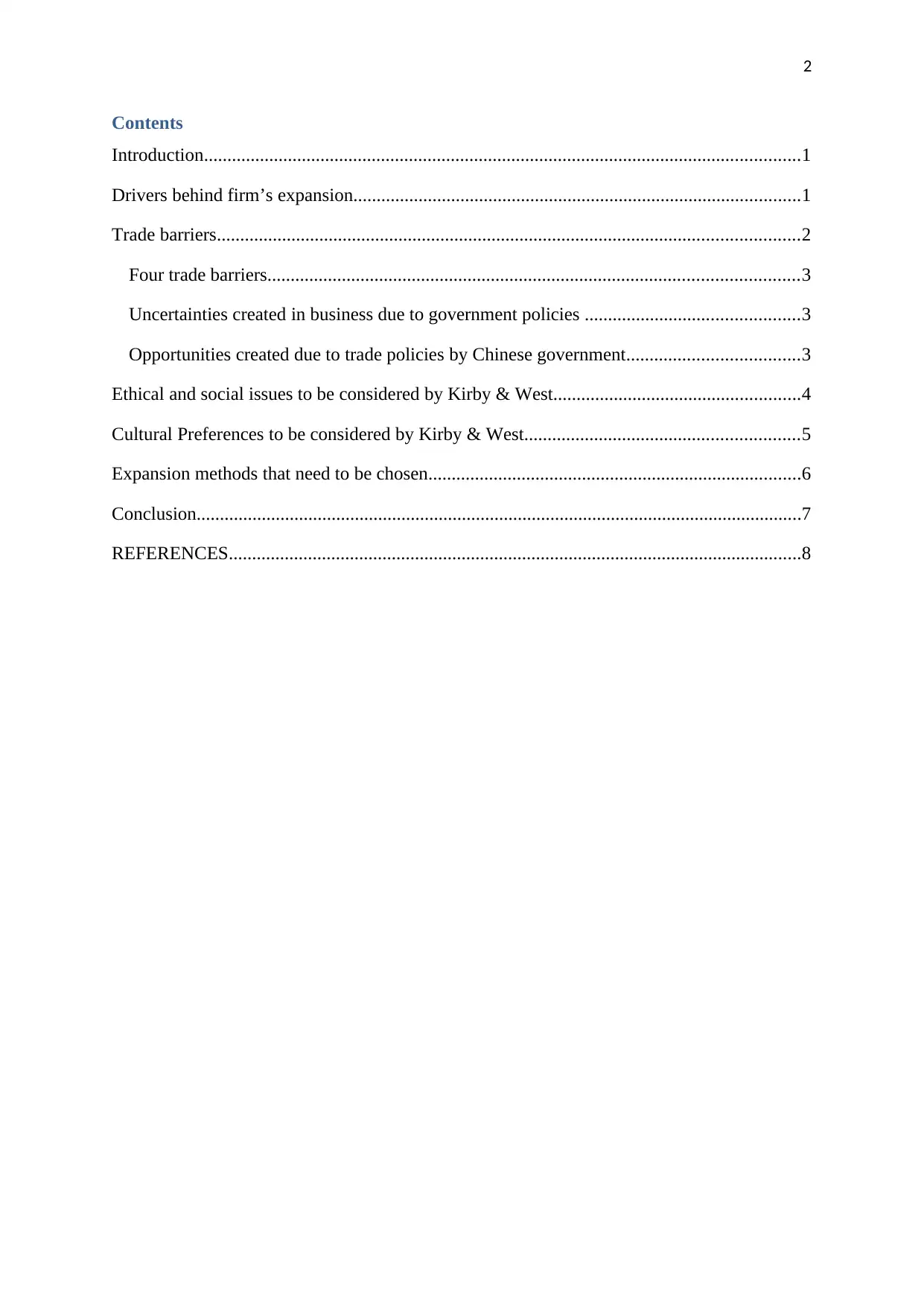
2
Contents
Introduction................................................................................................................................1
Drivers behind firm’s expansion................................................................................................1
Trade barriers.............................................................................................................................2
Four trade barriers..................................................................................................................3
Uncertainties created in business due to government policies ..............................................3
Opportunities created due to trade policies by Chinese government.....................................3
Ethical and social issues to be considered by Kirby & West.....................................................4
Cultural Preferences to be considered by Kirby & West...........................................................5
Expansion methods that need to be chosen................................................................................6
Conclusion..................................................................................................................................7
REFERENCES...........................................................................................................................8
Contents
Introduction................................................................................................................................1
Drivers behind firm’s expansion................................................................................................1
Trade barriers.............................................................................................................................2
Four trade barriers..................................................................................................................3
Uncertainties created in business due to government policies ..............................................3
Opportunities created due to trade policies by Chinese government.....................................3
Ethical and social issues to be considered by Kirby & West.....................................................4
Cultural Preferences to be considered by Kirby & West...........................................................5
Expansion methods that need to be chosen................................................................................6
Conclusion..................................................................................................................................7
REFERENCES...........................................................................................................................8
⊘ This is a preview!⊘
Do you want full access?
Subscribe today to unlock all pages.

Trusted by 1+ million students worldwide
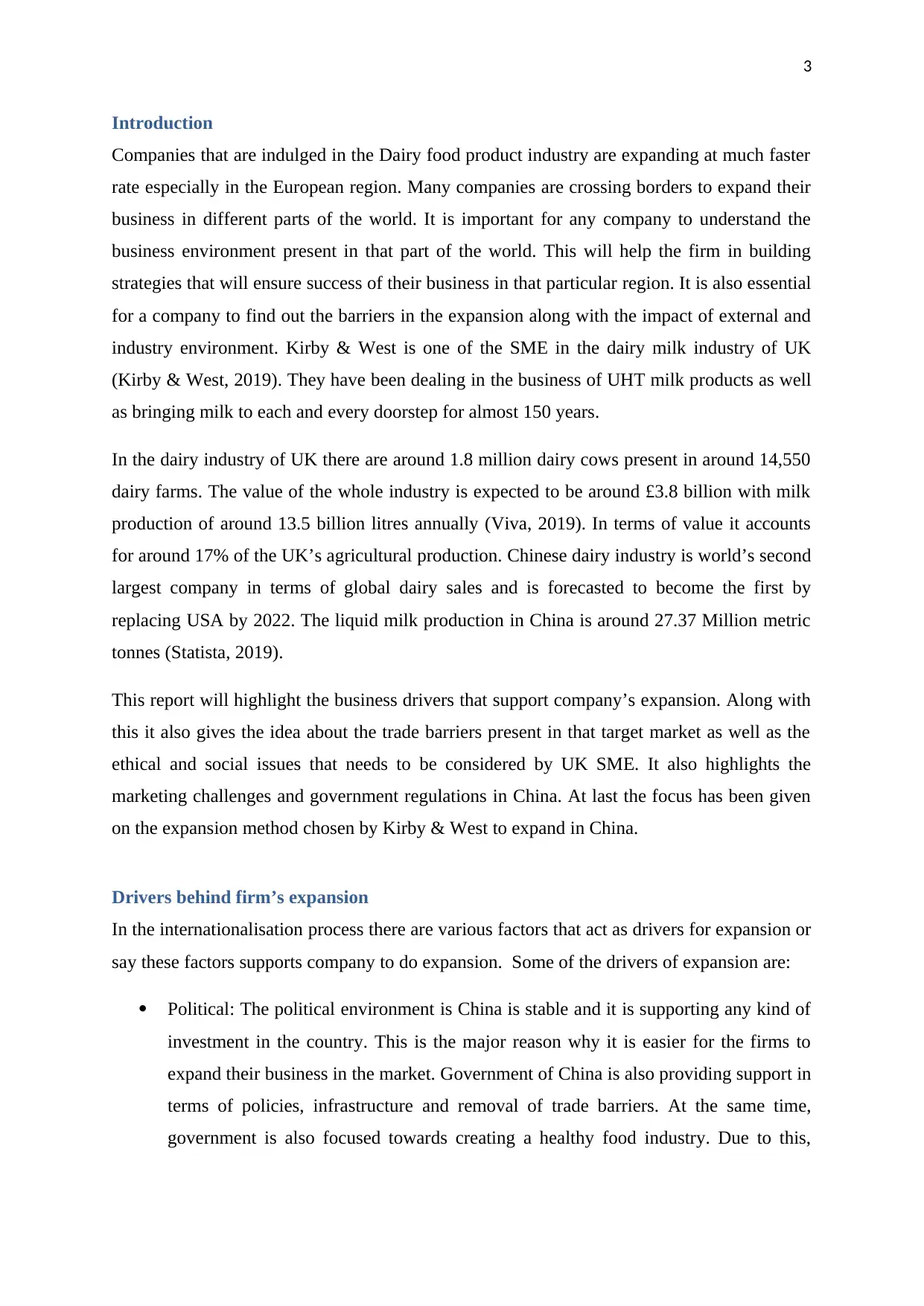
3
Introduction
Companies that are indulged in the Dairy food product industry are expanding at much faster
rate especially in the European region. Many companies are crossing borders to expand their
business in different parts of the world. It is important for any company to understand the
business environment present in that part of the world. This will help the firm in building
strategies that will ensure success of their business in that particular region. It is also essential
for a company to find out the barriers in the expansion along with the impact of external and
industry environment. Kirby & West is one of the SME in the dairy milk industry of UK
(Kirby & West, 2019). They have been dealing in the business of UHT milk products as well
as bringing milk to each and every doorstep for almost 150 years.
In the dairy industry of UK there are around 1.8 million dairy cows present in around 14,550
dairy farms. The value of the whole industry is expected to be around £3.8 billion with milk
production of around 13.5 billion litres annually (Viva, 2019). In terms of value it accounts
for around 17% of the UK’s agricultural production. Chinese dairy industry is world’s second
largest company in terms of global dairy sales and is forecasted to become the first by
replacing USA by 2022. The liquid milk production in China is around 27.37 Million metric
tonnes (Statista, 2019).
This report will highlight the business drivers that support company’s expansion. Along with
this it also gives the idea about the trade barriers present in that target market as well as the
ethical and social issues that needs to be considered by UK SME. It also highlights the
marketing challenges and government regulations in China. At last the focus has been given
on the expansion method chosen by Kirby & West to expand in China.
Drivers behind firm’s expansion
In the internationalisation process there are various factors that act as drivers for expansion or
say these factors supports company to do expansion. Some of the drivers of expansion are:
Political: The political environment is China is stable and it is supporting any kind of
investment in the country. This is the major reason why it is easier for the firms to
expand their business in the market. Government of China is also providing support in
terms of policies, infrastructure and removal of trade barriers. At the same time,
government is also focused towards creating a healthy food industry. Due to this,
Introduction
Companies that are indulged in the Dairy food product industry are expanding at much faster
rate especially in the European region. Many companies are crossing borders to expand their
business in different parts of the world. It is important for any company to understand the
business environment present in that part of the world. This will help the firm in building
strategies that will ensure success of their business in that particular region. It is also essential
for a company to find out the barriers in the expansion along with the impact of external and
industry environment. Kirby & West is one of the SME in the dairy milk industry of UK
(Kirby & West, 2019). They have been dealing in the business of UHT milk products as well
as bringing milk to each and every doorstep for almost 150 years.
In the dairy industry of UK there are around 1.8 million dairy cows present in around 14,550
dairy farms. The value of the whole industry is expected to be around £3.8 billion with milk
production of around 13.5 billion litres annually (Viva, 2019). In terms of value it accounts
for around 17% of the UK’s agricultural production. Chinese dairy industry is world’s second
largest company in terms of global dairy sales and is forecasted to become the first by
replacing USA by 2022. The liquid milk production in China is around 27.37 Million metric
tonnes (Statista, 2019).
This report will highlight the business drivers that support company’s expansion. Along with
this it also gives the idea about the trade barriers present in that target market as well as the
ethical and social issues that needs to be considered by UK SME. It also highlights the
marketing challenges and government regulations in China. At last the focus has been given
on the expansion method chosen by Kirby & West to expand in China.
Drivers behind firm’s expansion
In the internationalisation process there are various factors that act as drivers for expansion or
say these factors supports company to do expansion. Some of the drivers of expansion are:
Political: The political environment is China is stable and it is supporting any kind of
investment in the country. This is the major reason why it is easier for the firms to
expand their business in the market. Government of China is also providing support in
terms of policies, infrastructure and removal of trade barriers. At the same time,
government is also focused towards creating a healthy food industry. Due to this,
Paraphrase This Document
Need a fresh take? Get an instant paraphrase of this document with our AI Paraphraser
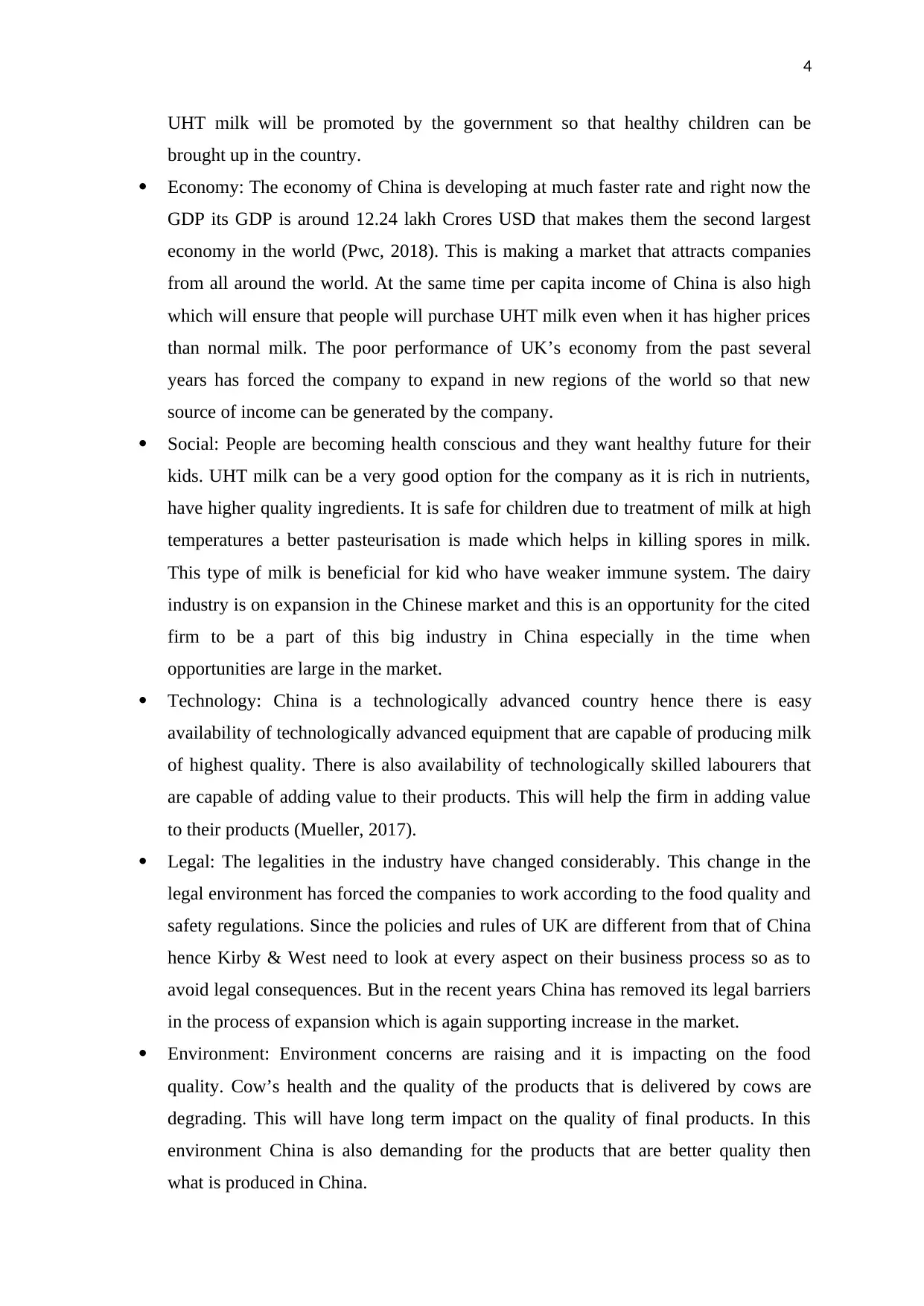
4
UHT milk will be promoted by the government so that healthy children can be
brought up in the country.
Economy: The economy of China is developing at much faster rate and right now the
GDP its GDP is around 12.24 lakh Crores USD that makes them the second largest
economy in the world (Pwc, 2018). This is making a market that attracts companies
from all around the world. At the same time per capita income of China is also high
which will ensure that people will purchase UHT milk even when it has higher prices
than normal milk. The poor performance of UK’s economy from the past several
years has forced the company to expand in new regions of the world so that new
source of income can be generated by the company.
Social: People are becoming health conscious and they want healthy future for their
kids. UHT milk can be a very good option for the company as it is rich in nutrients,
have higher quality ingredients. It is safe for children due to treatment of milk at high
temperatures a better pasteurisation is made which helps in killing spores in milk.
This type of milk is beneficial for kid who have weaker immune system. The dairy
industry is on expansion in the Chinese market and this is an opportunity for the cited
firm to be a part of this big industry in China especially in the time when
opportunities are large in the market.
Technology: China is a technologically advanced country hence there is easy
availability of technologically advanced equipment that are capable of producing milk
of highest quality. There is also availability of technologically skilled labourers that
are capable of adding value to their products. This will help the firm in adding value
to their products (Mueller, 2017).
Legal: The legalities in the industry have changed considerably. This change in the
legal environment has forced the companies to work according to the food quality and
safety regulations. Since the policies and rules of UK are different from that of China
hence Kirby & West need to look at every aspect on their business process so as to
avoid legal consequences. But in the recent years China has removed its legal barriers
in the process of expansion which is again supporting increase in the market.
Environment: Environment concerns are raising and it is impacting on the food
quality. Cow’s health and the quality of the products that is delivered by cows are
degrading. This will have long term impact on the quality of final products. In this
environment China is also demanding for the products that are better quality then
what is produced in China.
UHT milk will be promoted by the government so that healthy children can be
brought up in the country.
Economy: The economy of China is developing at much faster rate and right now the
GDP its GDP is around 12.24 lakh Crores USD that makes them the second largest
economy in the world (Pwc, 2018). This is making a market that attracts companies
from all around the world. At the same time per capita income of China is also high
which will ensure that people will purchase UHT milk even when it has higher prices
than normal milk. The poor performance of UK’s economy from the past several
years has forced the company to expand in new regions of the world so that new
source of income can be generated by the company.
Social: People are becoming health conscious and they want healthy future for their
kids. UHT milk can be a very good option for the company as it is rich in nutrients,
have higher quality ingredients. It is safe for children due to treatment of milk at high
temperatures a better pasteurisation is made which helps in killing spores in milk.
This type of milk is beneficial for kid who have weaker immune system. The dairy
industry is on expansion in the Chinese market and this is an opportunity for the cited
firm to be a part of this big industry in China especially in the time when
opportunities are large in the market.
Technology: China is a technologically advanced country hence there is easy
availability of technologically advanced equipment that are capable of producing milk
of highest quality. There is also availability of technologically skilled labourers that
are capable of adding value to their products. This will help the firm in adding value
to their products (Mueller, 2017).
Legal: The legalities in the industry have changed considerably. This change in the
legal environment has forced the companies to work according to the food quality and
safety regulations. Since the policies and rules of UK are different from that of China
hence Kirby & West need to look at every aspect on their business process so as to
avoid legal consequences. But in the recent years China has removed its legal barriers
in the process of expansion which is again supporting increase in the market.
Environment: Environment concerns are raising and it is impacting on the food
quality. Cow’s health and the quality of the products that is delivered by cows are
degrading. This will have long term impact on the quality of final products. In this
environment China is also demanding for the products that are better quality then
what is produced in China.
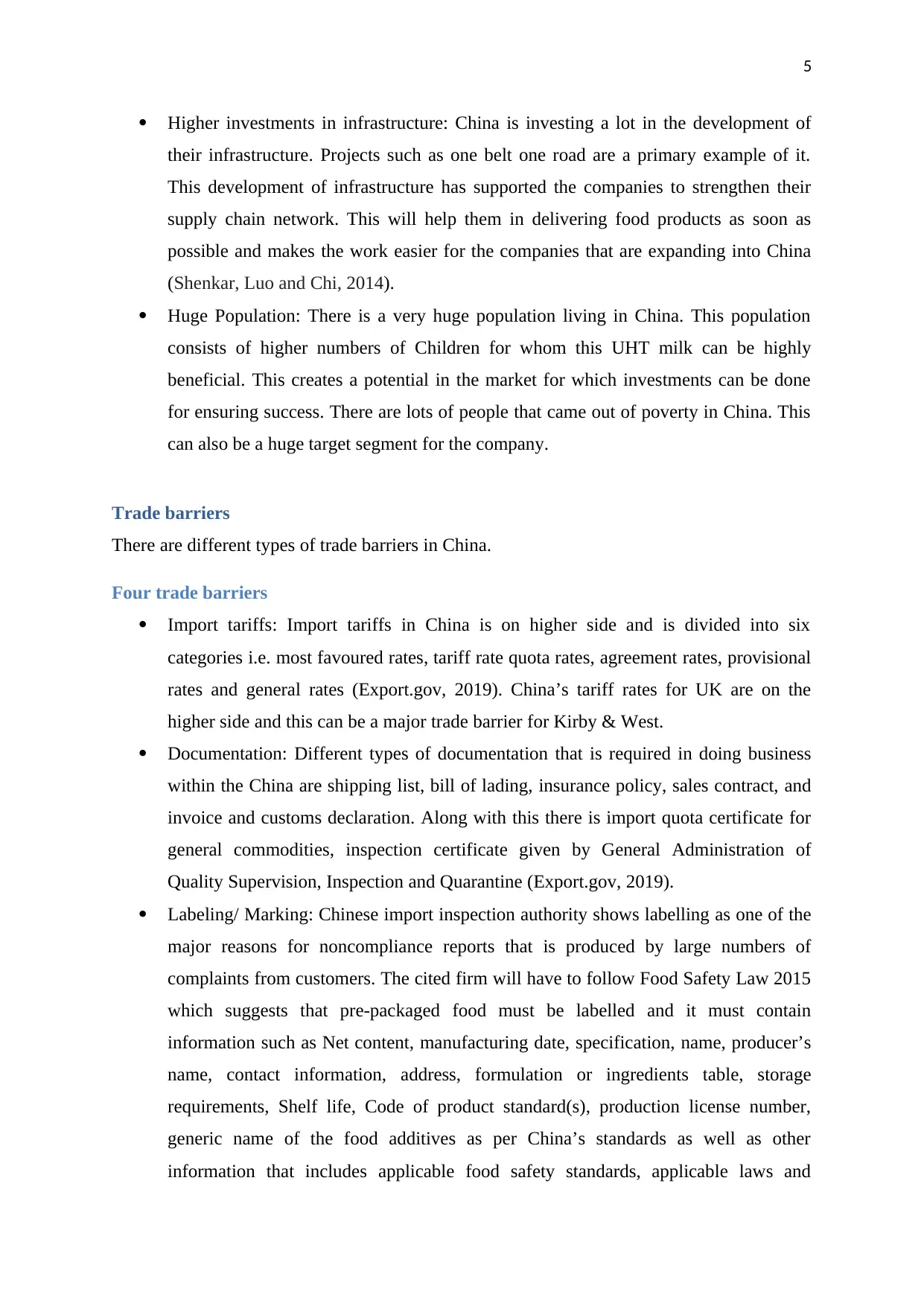
5
Higher investments in infrastructure: China is investing a lot in the development of
their infrastructure. Projects such as one belt one road are a primary example of it.
This development of infrastructure has supported the companies to strengthen their
supply chain network. This will help them in delivering food products as soon as
possible and makes the work easier for the companies that are expanding into China
(Shenkar, Luo and Chi, 2014).
Huge Population: There is a very huge population living in China. This population
consists of higher numbers of Children for whom this UHT milk can be highly
beneficial. This creates a potential in the market for which investments can be done
for ensuring success. There are lots of people that came out of poverty in China. This
can also be a huge target segment for the company.
Trade barriers
There are different types of trade barriers in China.
Four trade barriers
Import tariffs: Import tariffs in China is on higher side and is divided into six
categories i.e. most favoured rates, tariff rate quota rates, agreement rates, provisional
rates and general rates (Export.gov, 2019). China’s tariff rates for UK are on the
higher side and this can be a major trade barrier for Kirby & West.
Documentation: Different types of documentation that is required in doing business
within the China are shipping list, bill of lading, insurance policy, sales contract, and
invoice and customs declaration. Along with this there is import quota certificate for
general commodities, inspection certificate given by General Administration of
Quality Supervision, Inspection and Quarantine (Export.gov, 2019).
Labeling/ Marking: Chinese import inspection authority shows labelling as one of the
major reasons for noncompliance reports that is produced by large numbers of
complaints from customers. The cited firm will have to follow Food Safety Law 2015
which suggests that pre-packaged food must be labelled and it must contain
information such as Net content, manufacturing date, specification, name, producer’s
name, contact information, address, formulation or ingredients table, storage
requirements, Shelf life, Code of product standard(s), production license number,
generic name of the food additives as per China’s standards as well as other
information that includes applicable food safety standards, applicable laws and
Higher investments in infrastructure: China is investing a lot in the development of
their infrastructure. Projects such as one belt one road are a primary example of it.
This development of infrastructure has supported the companies to strengthen their
supply chain network. This will help them in delivering food products as soon as
possible and makes the work easier for the companies that are expanding into China
(Shenkar, Luo and Chi, 2014).
Huge Population: There is a very huge population living in China. This population
consists of higher numbers of Children for whom this UHT milk can be highly
beneficial. This creates a potential in the market for which investments can be done
for ensuring success. There are lots of people that came out of poverty in China. This
can also be a huge target segment for the company.
Trade barriers
There are different types of trade barriers in China.
Four trade barriers
Import tariffs: Import tariffs in China is on higher side and is divided into six
categories i.e. most favoured rates, tariff rate quota rates, agreement rates, provisional
rates and general rates (Export.gov, 2019). China’s tariff rates for UK are on the
higher side and this can be a major trade barrier for Kirby & West.
Documentation: Different types of documentation that is required in doing business
within the China are shipping list, bill of lading, insurance policy, sales contract, and
invoice and customs declaration. Along with this there is import quota certificate for
general commodities, inspection certificate given by General Administration of
Quality Supervision, Inspection and Quarantine (Export.gov, 2019).
Labeling/ Marking: Chinese import inspection authority shows labelling as one of the
major reasons for noncompliance reports that is produced by large numbers of
complaints from customers. The cited firm will have to follow Food Safety Law 2015
which suggests that pre-packaged food must be labelled and it must contain
information such as Net content, manufacturing date, specification, name, producer’s
name, contact information, address, formulation or ingredients table, storage
requirements, Shelf life, Code of product standard(s), production license number,
generic name of the food additives as per China’s standards as well as other
information that includes applicable food safety standards, applicable laws and
⊘ This is a preview!⊘
Do you want full access?
Subscribe today to unlock all pages.

Trusted by 1+ million students worldwide
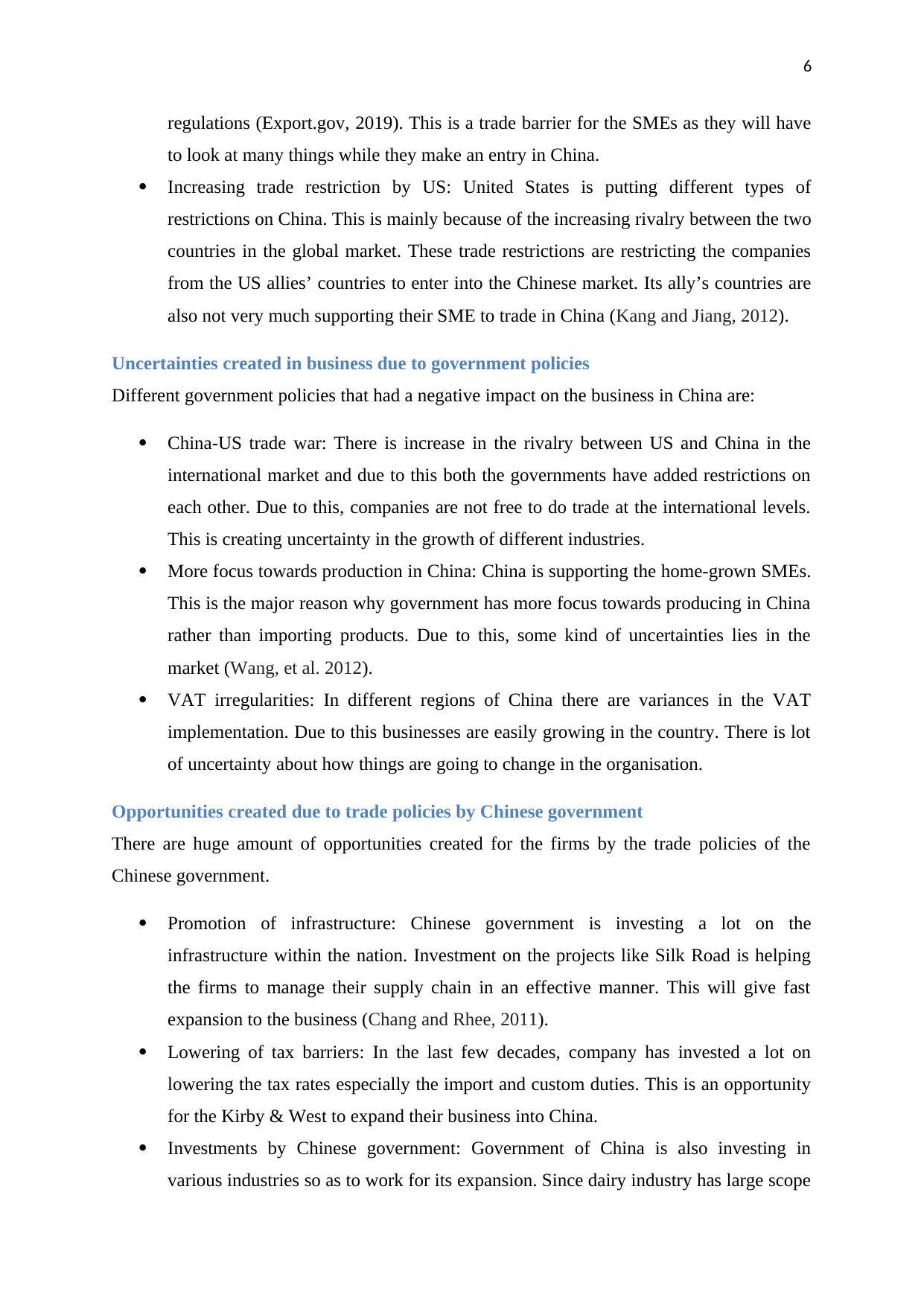
6
regulations (Export.gov, 2019). This is a trade barrier for the SMEs as they will have
to look at many things while they make an entry in China.
Increasing trade restriction by US: United States is putting different types of
restrictions on China. This is mainly because of the increasing rivalry between the two
countries in the global market. These trade restrictions are restricting the companies
from the US allies’ countries to enter into the Chinese market. Its ally’s countries are
also not very much supporting their SME to trade in China (Kang and Jiang, 2012).
Uncertainties created in business due to government policies
Different government policies that had a negative impact on the business in China are:
China-US trade war: There is increase in the rivalry between US and China in the
international market and due to this both the governments have added restrictions on
each other. Due to this, companies are not free to do trade at the international levels.
This is creating uncertainty in the growth of different industries.
More focus towards production in China: China is supporting the home-grown SMEs.
This is the major reason why government has more focus towards producing in China
rather than importing products. Due to this, some kind of uncertainties lies in the
market (Wang, et al. 2012).
VAT irregularities: In different regions of China there are variances in the VAT
implementation. Due to this businesses are easily growing in the country. There is lot
of uncertainty about how things are going to change in the organisation.
Opportunities created due to trade policies by Chinese government
There are huge amount of opportunities created for the firms by the trade policies of the
Chinese government.
Promotion of infrastructure: Chinese government is investing a lot on the
infrastructure within the nation. Investment on the projects like Silk Road is helping
the firms to manage their supply chain in an effective manner. This will give fast
expansion to the business (Chang and Rhee, 2011).
Lowering of tax barriers: In the last few decades, company has invested a lot on
lowering the tax rates especially the import and custom duties. This is an opportunity
for the Kirby & West to expand their business into China.
Investments by Chinese government: Government of China is also investing in
various industries so as to work for its expansion. Since dairy industry has large scope
regulations (Export.gov, 2019). This is a trade barrier for the SMEs as they will have
to look at many things while they make an entry in China.
Increasing trade restriction by US: United States is putting different types of
restrictions on China. This is mainly because of the increasing rivalry between the two
countries in the global market. These trade restrictions are restricting the companies
from the US allies’ countries to enter into the Chinese market. Its ally’s countries are
also not very much supporting their SME to trade in China (Kang and Jiang, 2012).
Uncertainties created in business due to government policies
Different government policies that had a negative impact on the business in China are:
China-US trade war: There is increase in the rivalry between US and China in the
international market and due to this both the governments have added restrictions on
each other. Due to this, companies are not free to do trade at the international levels.
This is creating uncertainty in the growth of different industries.
More focus towards production in China: China is supporting the home-grown SMEs.
This is the major reason why government has more focus towards producing in China
rather than importing products. Due to this, some kind of uncertainties lies in the
market (Wang, et al. 2012).
VAT irregularities: In different regions of China there are variances in the VAT
implementation. Due to this businesses are easily growing in the country. There is lot
of uncertainty about how things are going to change in the organisation.
Opportunities created due to trade policies by Chinese government
There are huge amount of opportunities created for the firms by the trade policies of the
Chinese government.
Promotion of infrastructure: Chinese government is investing a lot on the
infrastructure within the nation. Investment on the projects like Silk Road is helping
the firms to manage their supply chain in an effective manner. This will give fast
expansion to the business (Chang and Rhee, 2011).
Lowering of tax barriers: In the last few decades, company has invested a lot on
lowering the tax rates especially the import and custom duties. This is an opportunity
for the Kirby & West to expand their business into China.
Investments by Chinese government: Government of China is also investing in
various industries so as to work for its expansion. Since dairy industry has large scope
Paraphrase This Document
Need a fresh take? Get an instant paraphrase of this document with our AI Paraphraser
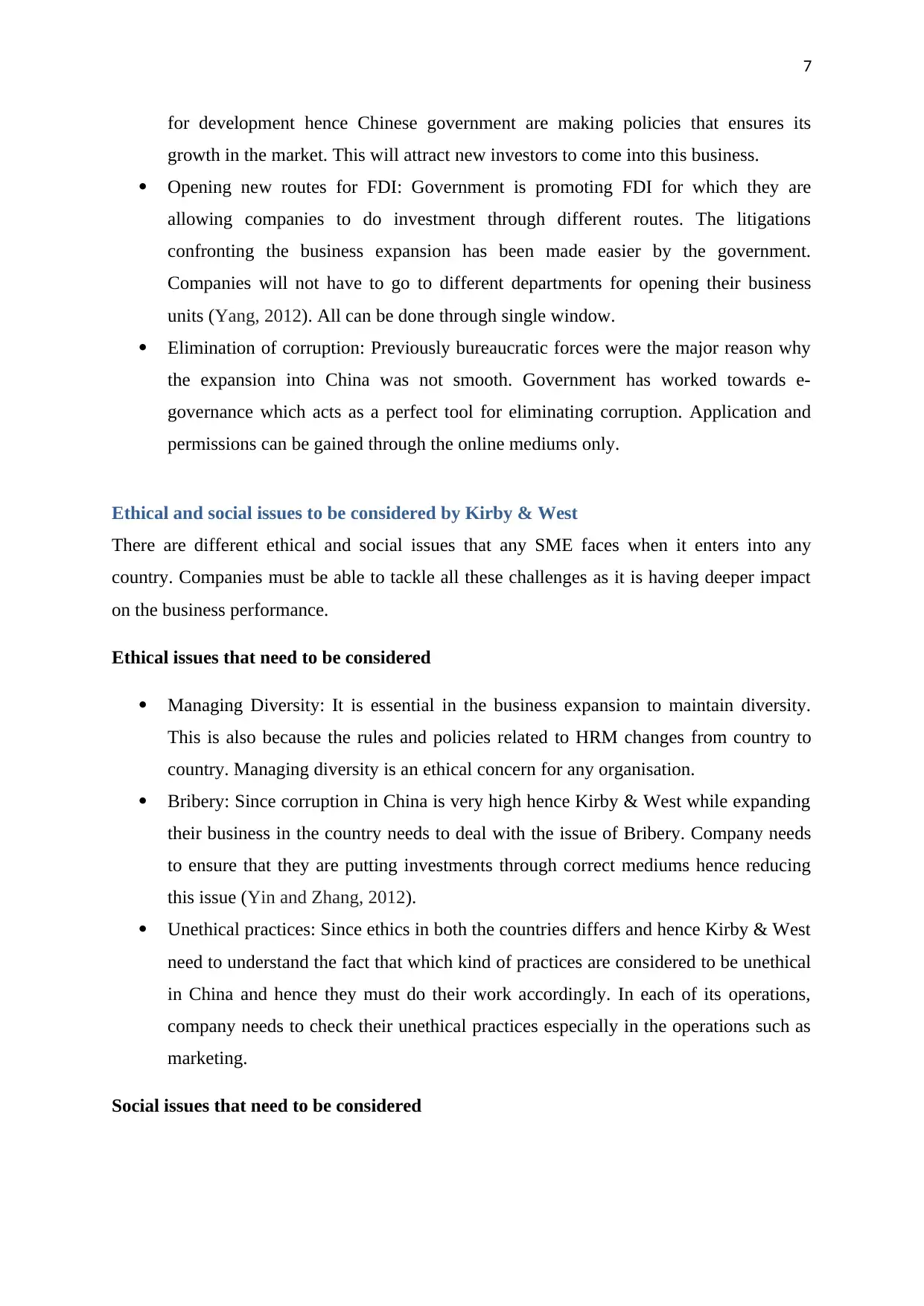
7
for development hence Chinese government are making policies that ensures its
growth in the market. This will attract new investors to come into this business.
Opening new routes for FDI: Government is promoting FDI for which they are
allowing companies to do investment through different routes. The litigations
confronting the business expansion has been made easier by the government.
Companies will not have to go to different departments for opening their business
units (Yang, 2012). All can be done through single window.
Elimination of corruption: Previously bureaucratic forces were the major reason why
the expansion into China was not smooth. Government has worked towards e-
governance which acts as a perfect tool for eliminating corruption. Application and
permissions can be gained through the online mediums only.
Ethical and social issues to be considered by Kirby & West
There are different ethical and social issues that any SME faces when it enters into any
country. Companies must be able to tackle all these challenges as it is having deeper impact
on the business performance.
Ethical issues that need to be considered
Managing Diversity: It is essential in the business expansion to maintain diversity.
This is also because the rules and policies related to HRM changes from country to
country. Managing diversity is an ethical concern for any organisation.
Bribery: Since corruption in China is very high hence Kirby & West while expanding
their business in the country needs to deal with the issue of Bribery. Company needs
to ensure that they are putting investments through correct mediums hence reducing
this issue (Yin and Zhang, 2012).
Unethical practices: Since ethics in both the countries differs and hence Kirby & West
need to understand the fact that which kind of practices are considered to be unethical
in China and hence they must do their work accordingly. In each of its operations,
company needs to check their unethical practices especially in the operations such as
marketing.
Social issues that need to be considered
for development hence Chinese government are making policies that ensures its
growth in the market. This will attract new investors to come into this business.
Opening new routes for FDI: Government is promoting FDI for which they are
allowing companies to do investment through different routes. The litigations
confronting the business expansion has been made easier by the government.
Companies will not have to go to different departments for opening their business
units (Yang, 2012). All can be done through single window.
Elimination of corruption: Previously bureaucratic forces were the major reason why
the expansion into China was not smooth. Government has worked towards e-
governance which acts as a perfect tool for eliminating corruption. Application and
permissions can be gained through the online mediums only.
Ethical and social issues to be considered by Kirby & West
There are different ethical and social issues that any SME faces when it enters into any
country. Companies must be able to tackle all these challenges as it is having deeper impact
on the business performance.
Ethical issues that need to be considered
Managing Diversity: It is essential in the business expansion to maintain diversity.
This is also because the rules and policies related to HRM changes from country to
country. Managing diversity is an ethical concern for any organisation.
Bribery: Since corruption in China is very high hence Kirby & West while expanding
their business in the country needs to deal with the issue of Bribery. Company needs
to ensure that they are putting investments through correct mediums hence reducing
this issue (Yin and Zhang, 2012).
Unethical practices: Since ethics in both the countries differs and hence Kirby & West
need to understand the fact that which kind of practices are considered to be unethical
in China and hence they must do their work accordingly. In each of its operations,
company needs to check their unethical practices especially in the operations such as
marketing.
Social issues that need to be considered
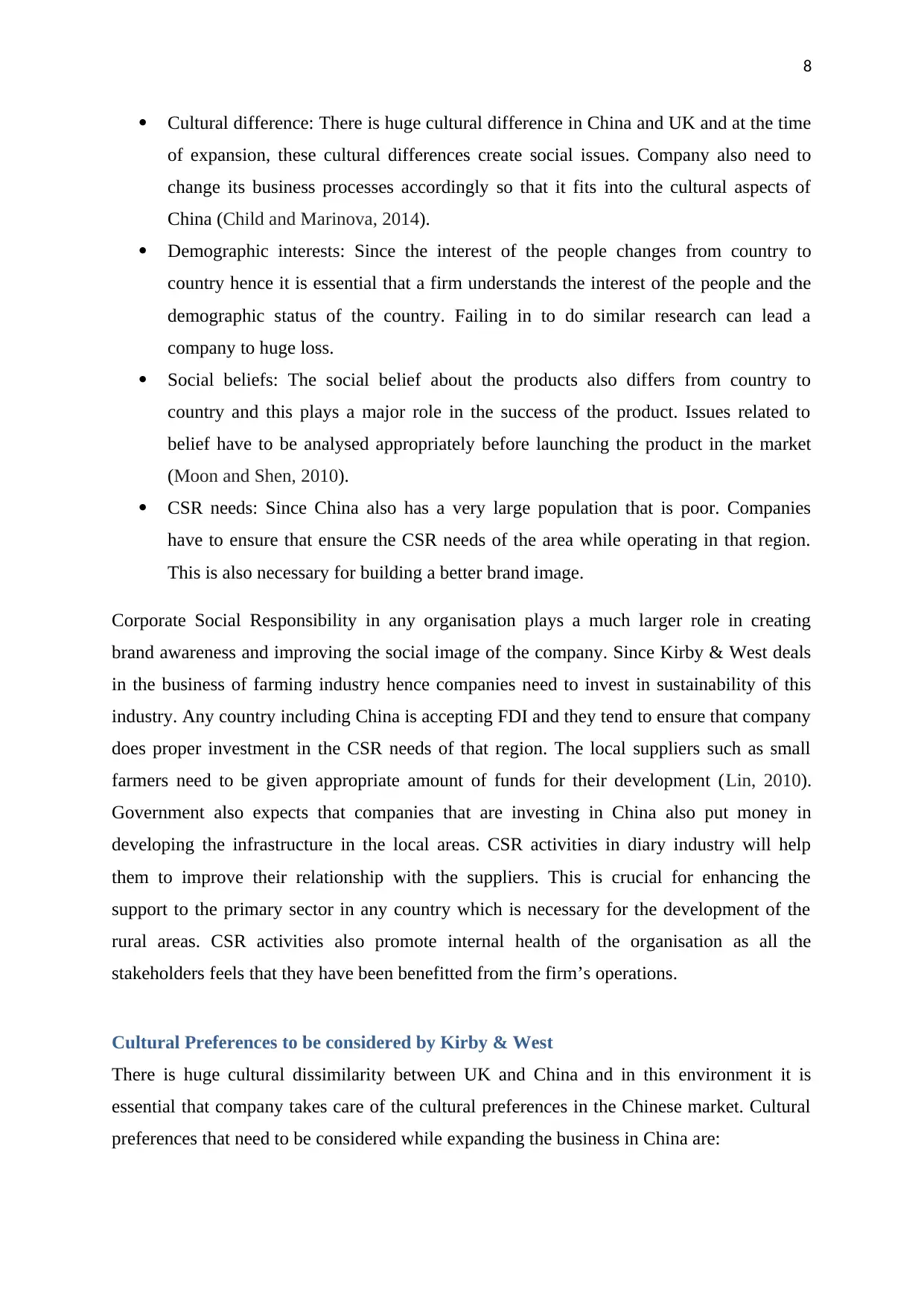
8
Cultural difference: There is huge cultural difference in China and UK and at the time
of expansion, these cultural differences create social issues. Company also need to
change its business processes accordingly so that it fits into the cultural aspects of
China (Child and Marinova, 2014).
Demographic interests: Since the interest of the people changes from country to
country hence it is essential that a firm understands the interest of the people and the
demographic status of the country. Failing in to do similar research can lead a
company to huge loss.
Social beliefs: The social belief about the products also differs from country to
country and this plays a major role in the success of the product. Issues related to
belief have to be analysed appropriately before launching the product in the market
(Moon and Shen, 2010).
CSR needs: Since China also has a very large population that is poor. Companies
have to ensure that ensure the CSR needs of the area while operating in that region.
This is also necessary for building a better brand image.
Corporate Social Responsibility in any organisation plays a much larger role in creating
brand awareness and improving the social image of the company. Since Kirby & West deals
in the business of farming industry hence companies need to invest in sustainability of this
industry. Any country including China is accepting FDI and they tend to ensure that company
does proper investment in the CSR needs of that region. The local suppliers such as small
farmers need to be given appropriate amount of funds for their development (Lin, 2010).
Government also expects that companies that are investing in China also put money in
developing the infrastructure in the local areas. CSR activities in diary industry will help
them to improve their relationship with the suppliers. This is crucial for enhancing the
support to the primary sector in any country which is necessary for the development of the
rural areas. CSR activities also promote internal health of the organisation as all the
stakeholders feels that they have been benefitted from the firm’s operations.
Cultural Preferences to be considered by Kirby & West
There is huge cultural dissimilarity between UK and China and in this environment it is
essential that company takes care of the cultural preferences in the Chinese market. Cultural
preferences that need to be considered while expanding the business in China are:
Cultural difference: There is huge cultural difference in China and UK and at the time
of expansion, these cultural differences create social issues. Company also need to
change its business processes accordingly so that it fits into the cultural aspects of
China (Child and Marinova, 2014).
Demographic interests: Since the interest of the people changes from country to
country hence it is essential that a firm understands the interest of the people and the
demographic status of the country. Failing in to do similar research can lead a
company to huge loss.
Social beliefs: The social belief about the products also differs from country to
country and this plays a major role in the success of the product. Issues related to
belief have to be analysed appropriately before launching the product in the market
(Moon and Shen, 2010).
CSR needs: Since China also has a very large population that is poor. Companies
have to ensure that ensure the CSR needs of the area while operating in that region.
This is also necessary for building a better brand image.
Corporate Social Responsibility in any organisation plays a much larger role in creating
brand awareness and improving the social image of the company. Since Kirby & West deals
in the business of farming industry hence companies need to invest in sustainability of this
industry. Any country including China is accepting FDI and they tend to ensure that company
does proper investment in the CSR needs of that region. The local suppliers such as small
farmers need to be given appropriate amount of funds for their development (Lin, 2010).
Government also expects that companies that are investing in China also put money in
developing the infrastructure in the local areas. CSR activities in diary industry will help
them to improve their relationship with the suppliers. This is crucial for enhancing the
support to the primary sector in any country which is necessary for the development of the
rural areas. CSR activities also promote internal health of the organisation as all the
stakeholders feels that they have been benefitted from the firm’s operations.
Cultural Preferences to be considered by Kirby & West
There is huge cultural dissimilarity between UK and China and in this environment it is
essential that company takes care of the cultural preferences in the Chinese market. Cultural
preferences that need to be considered while expanding the business in China are:
⊘ This is a preview!⊘
Do you want full access?
Subscribe today to unlock all pages.

Trusted by 1+ million students worldwide
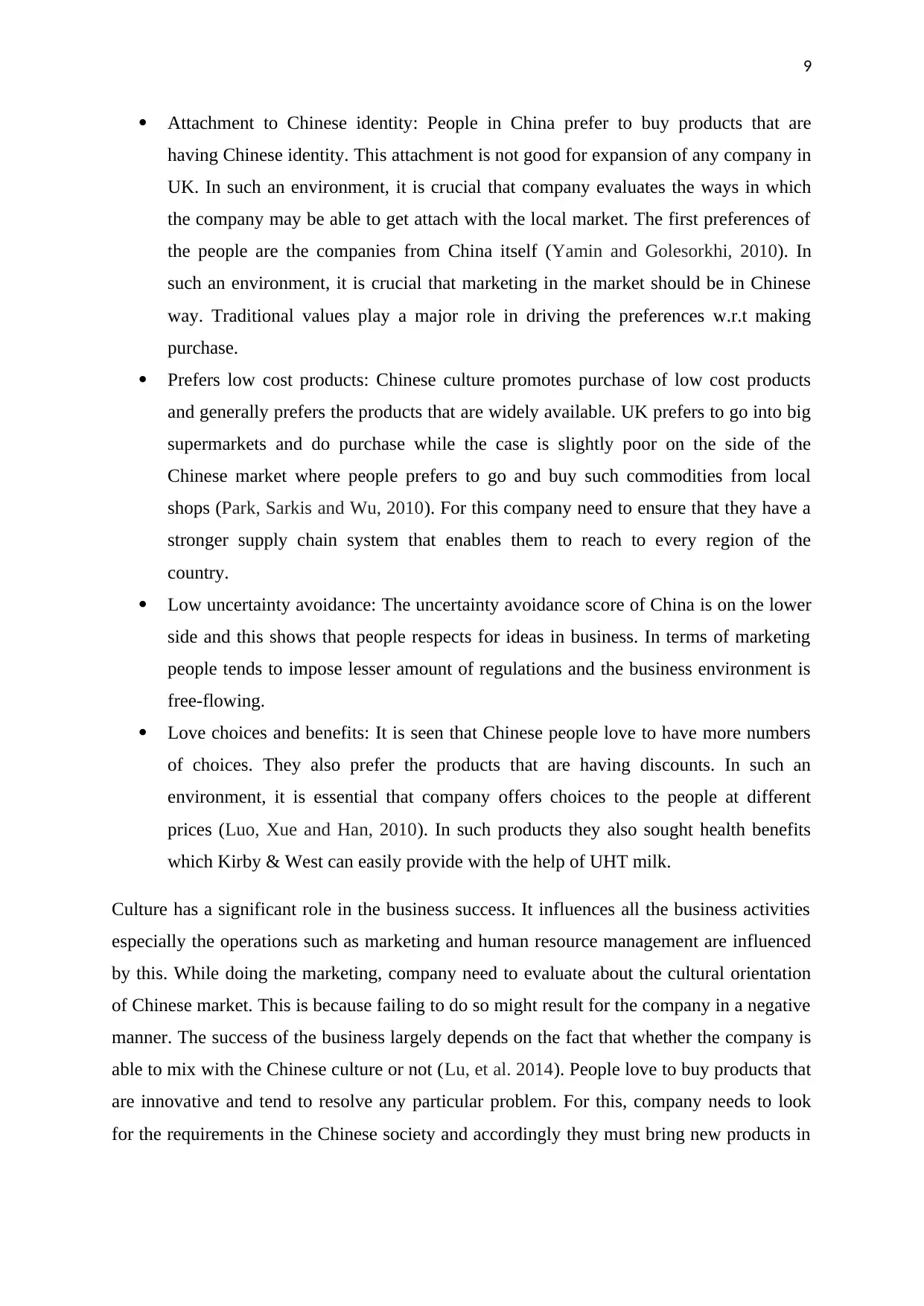
9
Attachment to Chinese identity: People in China prefer to buy products that are
having Chinese identity. This attachment is not good for expansion of any company in
UK. In such an environment, it is crucial that company evaluates the ways in which
the company may be able to get attach with the local market. The first preferences of
the people are the companies from China itself (Yamin and Golesorkhi, 2010). In
such an environment, it is crucial that marketing in the market should be in Chinese
way. Traditional values play a major role in driving the preferences w.r.t making
purchase.
Prefers low cost products: Chinese culture promotes purchase of low cost products
and generally prefers the products that are widely available. UK prefers to go into big
supermarkets and do purchase while the case is slightly poor on the side of the
Chinese market where people prefers to go and buy such commodities from local
shops (Park, Sarkis and Wu, 2010). For this company need to ensure that they have a
stronger supply chain system that enables them to reach to every region of the
country.
Low uncertainty avoidance: The uncertainty avoidance score of China is on the lower
side and this shows that people respects for ideas in business. In terms of marketing
people tends to impose lesser amount of regulations and the business environment is
free-flowing.
Love choices and benefits: It is seen that Chinese people love to have more numbers
of choices. They also prefer the products that are having discounts. In such an
environment, it is essential that company offers choices to the people at different
prices (Luo, Xue and Han, 2010). In such products they also sought health benefits
which Kirby & West can easily provide with the help of UHT milk.
Culture has a significant role in the business success. It influences all the business activities
especially the operations such as marketing and human resource management are influenced
by this. While doing the marketing, company need to evaluate about the cultural orientation
of Chinese market. This is because failing to do so might result for the company in a negative
manner. The success of the business largely depends on the fact that whether the company is
able to mix with the Chinese culture or not (Lu, et al. 2014). People love to buy products that
are innovative and tend to resolve any particular problem. For this, company needs to look
for the requirements in the Chinese society and accordingly they must bring new products in
Attachment to Chinese identity: People in China prefer to buy products that are
having Chinese identity. This attachment is not good for expansion of any company in
UK. In such an environment, it is crucial that company evaluates the ways in which
the company may be able to get attach with the local market. The first preferences of
the people are the companies from China itself (Yamin and Golesorkhi, 2010). In
such an environment, it is crucial that marketing in the market should be in Chinese
way. Traditional values play a major role in driving the preferences w.r.t making
purchase.
Prefers low cost products: Chinese culture promotes purchase of low cost products
and generally prefers the products that are widely available. UK prefers to go into big
supermarkets and do purchase while the case is slightly poor on the side of the
Chinese market where people prefers to go and buy such commodities from local
shops (Park, Sarkis and Wu, 2010). For this company need to ensure that they have a
stronger supply chain system that enables them to reach to every region of the
country.
Low uncertainty avoidance: The uncertainty avoidance score of China is on the lower
side and this shows that people respects for ideas in business. In terms of marketing
people tends to impose lesser amount of regulations and the business environment is
free-flowing.
Love choices and benefits: It is seen that Chinese people love to have more numbers
of choices. They also prefer the products that are having discounts. In such an
environment, it is essential that company offers choices to the people at different
prices (Luo, Xue and Han, 2010). In such products they also sought health benefits
which Kirby & West can easily provide with the help of UHT milk.
Culture has a significant role in the business success. It influences all the business activities
especially the operations such as marketing and human resource management are influenced
by this. While doing the marketing, company need to evaluate about the cultural orientation
of Chinese market. This is because failing to do so might result for the company in a negative
manner. The success of the business largely depends on the fact that whether the company is
able to mix with the Chinese culture or not (Lu, et al. 2014). People love to buy products that
are innovative and tend to resolve any particular problem. For this, company needs to look
for the requirements in the Chinese society and accordingly they must bring new products in
Paraphrase This Document
Need a fresh take? Get an instant paraphrase of this document with our AI Paraphraser
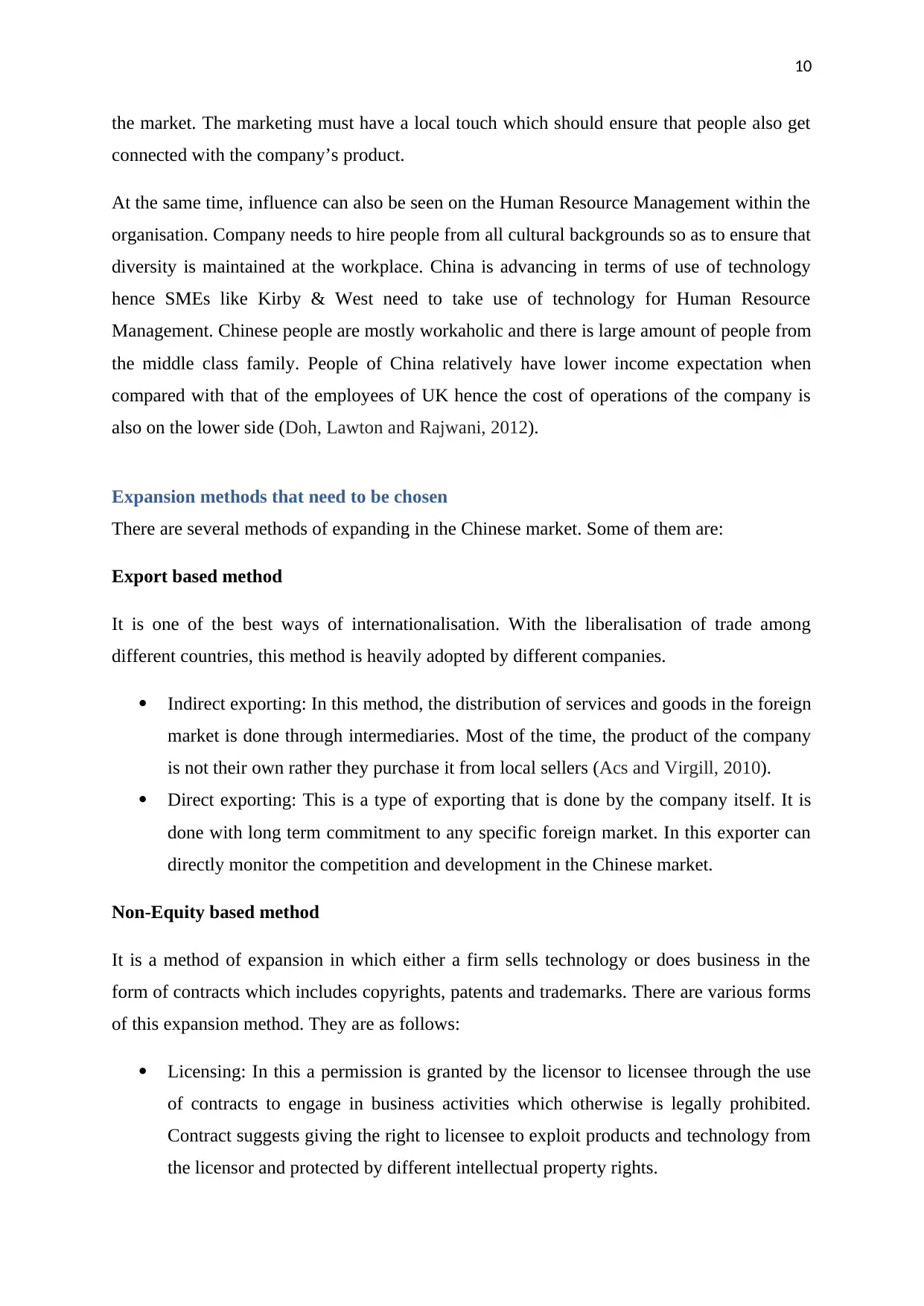
10
the market. The marketing must have a local touch which should ensure that people also get
connected with the company’s product.
At the same time, influence can also be seen on the Human Resource Management within the
organisation. Company needs to hire people from all cultural backgrounds so as to ensure that
diversity is maintained at the workplace. China is advancing in terms of use of technology
hence SMEs like Kirby & West need to take use of technology for Human Resource
Management. Chinese people are mostly workaholic and there is large amount of people from
the middle class family. People of China relatively have lower income expectation when
compared with that of the employees of UK hence the cost of operations of the company is
also on the lower side (Doh, Lawton and Rajwani, 2012).
Expansion methods that need to be chosen
There are several methods of expanding in the Chinese market. Some of them are:
Export based method
It is one of the best ways of internationalisation. With the liberalisation of trade among
different countries, this method is heavily adopted by different companies.
Indirect exporting: In this method, the distribution of services and goods in the foreign
market is done through intermediaries. Most of the time, the product of the company
is not their own rather they purchase it from local sellers (Acs and Virgill, 2010).
Direct exporting: This is a type of exporting that is done by the company itself. It is
done with long term commitment to any specific foreign market. In this exporter can
directly monitor the competition and development in the Chinese market.
Non-Equity based method
It is a method of expansion in which either a firm sells technology or does business in the
form of contracts which includes copyrights, patents and trademarks. There are various forms
of this expansion method. They are as follows:
Licensing: In this a permission is granted by the licensor to licensee through the use
of contracts to engage in business activities which otherwise is legally prohibited.
Contract suggests giving the right to licensee to exploit products and technology from
the licensor and protected by different intellectual property rights.
the market. The marketing must have a local touch which should ensure that people also get
connected with the company’s product.
At the same time, influence can also be seen on the Human Resource Management within the
organisation. Company needs to hire people from all cultural backgrounds so as to ensure that
diversity is maintained at the workplace. China is advancing in terms of use of technology
hence SMEs like Kirby & West need to take use of technology for Human Resource
Management. Chinese people are mostly workaholic and there is large amount of people from
the middle class family. People of China relatively have lower income expectation when
compared with that of the employees of UK hence the cost of operations of the company is
also on the lower side (Doh, Lawton and Rajwani, 2012).
Expansion methods that need to be chosen
There are several methods of expanding in the Chinese market. Some of them are:
Export based method
It is one of the best ways of internationalisation. With the liberalisation of trade among
different countries, this method is heavily adopted by different companies.
Indirect exporting: In this method, the distribution of services and goods in the foreign
market is done through intermediaries. Most of the time, the product of the company
is not their own rather they purchase it from local sellers (Acs and Virgill, 2010).
Direct exporting: This is a type of exporting that is done by the company itself. It is
done with long term commitment to any specific foreign market. In this exporter can
directly monitor the competition and development in the Chinese market.
Non-Equity based method
It is a method of expansion in which either a firm sells technology or does business in the
form of contracts which includes copyrights, patents and trademarks. There are various forms
of this expansion method. They are as follows:
Licensing: In this a permission is granted by the licensor to licensee through the use
of contracts to engage in business activities which otherwise is legally prohibited.
Contract suggests giving the right to licensee to exploit products and technology from
the licensor and protected by different intellectual property rights.
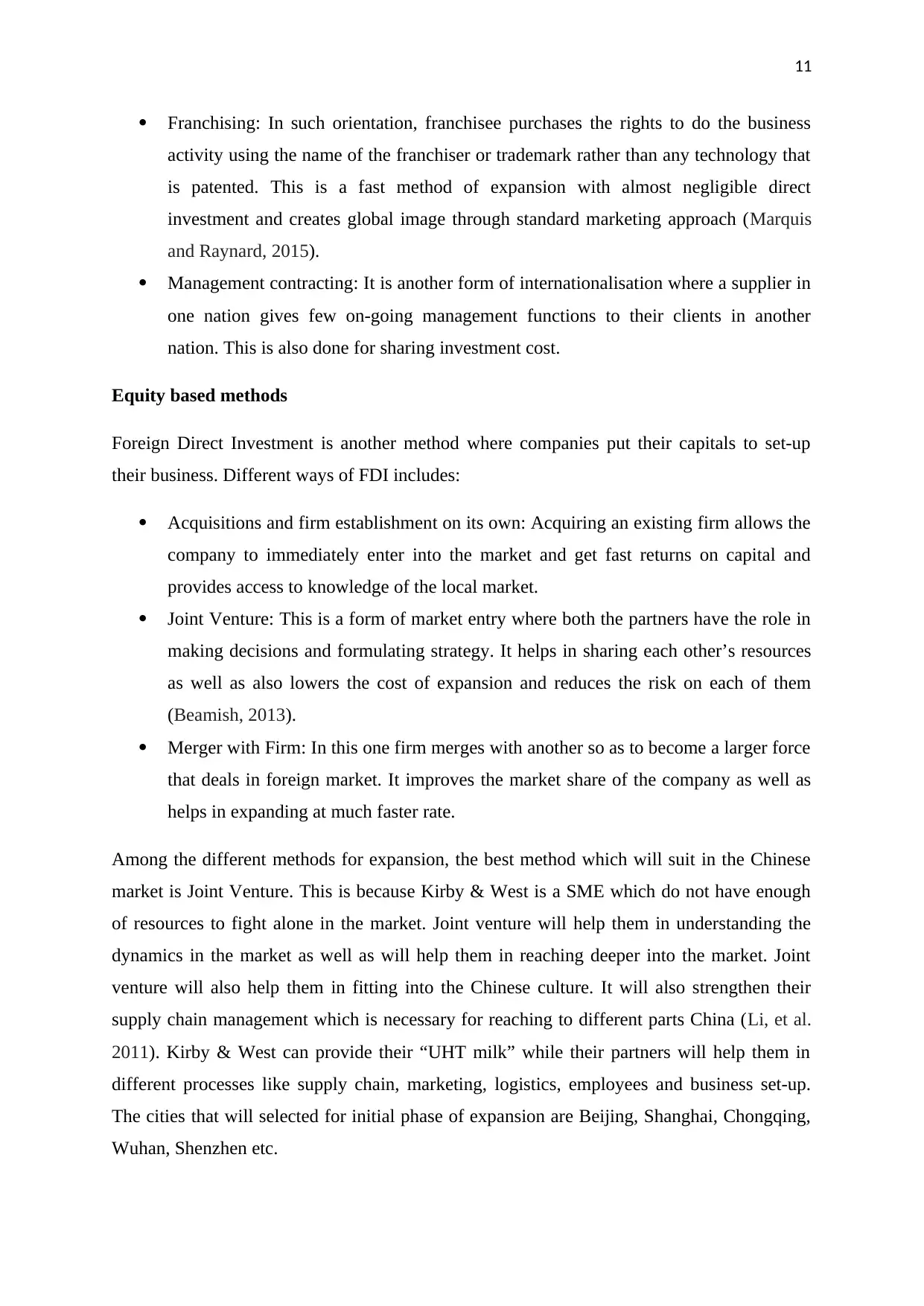
11
Franchising: In such orientation, franchisee purchases the rights to do the business
activity using the name of the franchiser or trademark rather than any technology that
is patented. This is a fast method of expansion with almost negligible direct
investment and creates global image through standard marketing approach (Marquis
and Raynard, 2015).
Management contracting: It is another form of internationalisation where a supplier in
one nation gives few on-going management functions to their clients in another
nation. This is also done for sharing investment cost.
Equity based methods
Foreign Direct Investment is another method where companies put their capitals to set-up
their business. Different ways of FDI includes:
Acquisitions and firm establishment on its own: Acquiring an existing firm allows the
company to immediately enter into the market and get fast returns on capital and
provides access to knowledge of the local market.
Joint Venture: This is a form of market entry where both the partners have the role in
making decisions and formulating strategy. It helps in sharing each other’s resources
as well as also lowers the cost of expansion and reduces the risk on each of them
(Beamish, 2013).
Merger with Firm: In this one firm merges with another so as to become a larger force
that deals in foreign market. It improves the market share of the company as well as
helps in expanding at much faster rate.
Among the different methods for expansion, the best method which will suit in the Chinese
market is Joint Venture. This is because Kirby & West is a SME which do not have enough
of resources to fight alone in the market. Joint venture will help them in understanding the
dynamics in the market as well as will help them in reaching deeper into the market. Joint
venture will also help them in fitting into the Chinese culture. It will also strengthen their
supply chain management which is necessary for reaching to different parts China (Li, et al.
2011). Kirby & West can provide their “UHT milk” while their partners will help them in
different processes like supply chain, marketing, logistics, employees and business set-up.
The cities that will selected for initial phase of expansion are Beijing, Shanghai, Chongqing,
Wuhan, Shenzhen etc.
Franchising: In such orientation, franchisee purchases the rights to do the business
activity using the name of the franchiser or trademark rather than any technology that
is patented. This is a fast method of expansion with almost negligible direct
investment and creates global image through standard marketing approach (Marquis
and Raynard, 2015).
Management contracting: It is another form of internationalisation where a supplier in
one nation gives few on-going management functions to their clients in another
nation. This is also done for sharing investment cost.
Equity based methods
Foreign Direct Investment is another method where companies put their capitals to set-up
their business. Different ways of FDI includes:
Acquisitions and firm establishment on its own: Acquiring an existing firm allows the
company to immediately enter into the market and get fast returns on capital and
provides access to knowledge of the local market.
Joint Venture: This is a form of market entry where both the partners have the role in
making decisions and formulating strategy. It helps in sharing each other’s resources
as well as also lowers the cost of expansion and reduces the risk on each of them
(Beamish, 2013).
Merger with Firm: In this one firm merges with another so as to become a larger force
that deals in foreign market. It improves the market share of the company as well as
helps in expanding at much faster rate.
Among the different methods for expansion, the best method which will suit in the Chinese
market is Joint Venture. This is because Kirby & West is a SME which do not have enough
of resources to fight alone in the market. Joint venture will help them in understanding the
dynamics in the market as well as will help them in reaching deeper into the market. Joint
venture will also help them in fitting into the Chinese culture. It will also strengthen their
supply chain management which is necessary for reaching to different parts China (Li, et al.
2011). Kirby & West can provide their “UHT milk” while their partners will help them in
different processes like supply chain, marketing, logistics, employees and business set-up.
The cities that will selected for initial phase of expansion are Beijing, Shanghai, Chongqing,
Wuhan, Shenzhen etc.
⊘ This is a preview!⊘
Do you want full access?
Subscribe today to unlock all pages.

Trusted by 1+ million students worldwide
1 out of 16
Related Documents
Your All-in-One AI-Powered Toolkit for Academic Success.
+13062052269
info@desklib.com
Available 24*7 on WhatsApp / Email
![[object Object]](/_next/static/media/star-bottom.7253800d.svg)
Unlock your academic potential
Copyright © 2020–2026 A2Z Services. All Rights Reserved. Developed and managed by ZUCOL.




